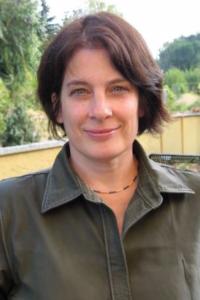Laura A Johnston, PhD
- Professor of Genetics & Development

Overview
Laura Johnston is Professor of Genetics & Development at Columbia University Medical Center in New York, and uses Drosophila as a model system to study the dynamics of tissue growth and size control in development, during regeneration, and in models of cancer. Since establishing her lab in 2000, her studies have a had particular emphasis on the role of MYC in cooperative and competitive cell behavior. At CUMC, Laura is a member of the Herbert Irving Comprehensive Cancer Center and the Columbia Stem Cell Initiative. She serves on the Editorial Advisory Boards for the journals Development and Royal Society Open Science, and is a member of the Scientific Advisory Committee of the Rita Allen Foundation. Laura is active in the greater scientific community and is a past President of the Drosophila Board of Directors, a national organization dedicated to promoting scholarly science in Drosophila research.
Academic Appointments
- Professor of Genetics & Development
Credentials & Experience
Education & Training
- PhD, 1994 Experimental Pathology, Univ of Washington Medical Center
- Fellowship: 1996 Univ of Washington Medical Center
- Fellowship: 1999 Fred Hutchinson Cancer Research Center
Honors & Awards
1975 PLU/U.S. Oil and Refining Co. Chemistry Fellow
1995 Individual NRSA, NIGMS
1999 FHCRC Fellow
2000 HHMI Research Resources Award (CUMC)
2001 Scholar of the V Foundation for Cancer Research
2002 Hirschl Charitable Trust Award
2002 NY Speakers Fund in Biomedical Sciences Award
2003 Plenary Speaker, National Drosophila Research Conference (GSA)
2004 Rita Allen Scholar
2006 American Cancer Society Research Scholar Award
2006 Blaffer Lecture, M.D. Anderson Cancer Center
2007 Harold and Golden Lamport Award for Excellence in Basic Science Research
2010 Café Science Public Lecture - 100 Years of Genetics at Columbia
2010 Plenary Speaker, Rita Allen Scholars Symposium, Princeton, NJ
2012 Visiting Professor, Department of Zoology, Oxford University, UK (Sabbatical)
2014 John B. Little Symposium, Harvard University
2017 President, US National Drosophila Board of Directors
Research
Fitness sensing during organ and tissue growth: internal surveillance mechanisms that promote healthy organ development
My laboratory investigates the mechanisms used by growing tissues to gauge and regulate the collective and individual fitness of cells, thereby optimizing tissue and animal fitness. We are interested in the basic biological mechanisms that regulate these processes, how they contribute to development of healthy tissues and in understanding their relevance to developmental and tumorigenic pathologies. We use the simple genetic model organism Drosophila and utilize strategies that allow manipulation of growth and cell fitness in living, growing animals. Our projects include: how the growth regulator Myc mediates competitive interactions during tissue and organ growth; investigation of homeostatic processes, including metabolism, that allow cells to sense and respond to growth changes in their local environment; identification of factors that act as sensors and mediators of cellular fitness; and genetic and molecular dissection of tissue regeneration. These processes provide plasticity to growing organs and give cells control over their local environment.
Grants
- R01GM078464, MECHANISMS OF CELL COMPETITION THAT REGULATE GROWTH DURING DEVELOPMENT. NIHGMS. 1-AUG-2006 - 30-JUL-2019.
- R01CA192838, AN INNATE SYSTEM FOR DETECTION OF ABERRANT TISSUE GROWTH. NCI. 1-DEC-2014 - 30-NOV-2019.
Selected Publications
Alpar, L., Bergantiños, C. and Johnston, L.A. (2018). Spatially restricted regulation of Spätzle/Toll signaling activity during cell competition. Developmental Cell 46 (6):706-719.e5.
Germani F, Bergantinos C, Johnston LA. ( 2018). Mosaic Analysis in Drosophila. Genetics. Feb 208 (2):473-490.
Meyer, S.N*., Amoyel, M*., Bergantinos, C*., de la Cova, C. Schertl, K., Basler, K. and Johnston, L. A. (*co first authors): (2014) An ancient defense system eliminates unfit cells from developing tissues during cell competition. Science 346 : (6214).
de la Cova, C., Senoo-Matsuda, N., Ziosi, M., Bellosta, P., Wu, D.C., Quinzii, C.M., and Johnston, L. A.: (2014) Super-competitor status of dMyc-expressing cells reprograms metabolism and requires p53 as a fitness sensor. Cell Metabolism 19: 470-483
Johnston, L. A. (2013) Socializing with Myc: Cell Competition in Development and as a Model for Pre-malignant Cancer in "MYC and the Pathway to Cancer", CSH Persp Med, Cold Spring Harbor Laboratory Press, Cold Spring Harbor, NY, USA, 2014
Wells, B. S. and Johnston, L. A.: (2012) Maintenance of imaginal disc plasticity and regenerative potential in Drosophila by p53. Developmental Biology 361: 263-276
Neto-Silva, R. M., de Beco, S. and Johnston, L. A: (2010) Evidence for a Growth-Stabilizing Regulatory Feedback Mechanism between Myc and Yorkie, the Drosophila Homolog of Yap. Developmental Cell 19: 507-520.
Wu DC and Johnston LA. (2010). Control of wing size and proportions by Drosophila Myc. Genetics 184: 1-13.
Caygill EE and Johnston LA. (2008) Temporal regulation of metamorphic processes in Drosophila by the let-7 and miR-125 heterochronic microRNAs. Current Biology 18: 943-950.
Senoo-Matsuda N and Johnston LA. (2007). Soluble factors mediate competitive and cooperative interactions between cells expressing different levels of Drosophila Myc. Proc. Nat. Acad.Sci.104 (47) 18543-18548.
Wells BS, Yoshida E, and Johnston LA. (2006). Compensatory proliferation in Drosophila imaginal discs requires Dronc-dependent p53 activity. Current Biology 16 (16):1-10.
de la Cova, C., Abril, M., Bellosta, P., Gallant, P., and Johnston, L. A: (2004) Drosophila Myc regulates organ size by inducing cell competition. Cell 117: 107-116
For a complete list of publications, please visit PubMed.gov